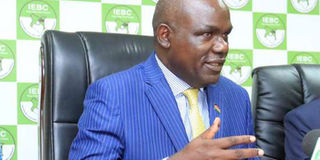One hopes IEBC will do much better on October 26

Independent Electoral and Boundaries Commission Chairman Wafula Chebukati speaks during a press conference on June 14, 2017. As indicated in the Supreme Court ruling, four judges agreed that the elections were marred by irregularities and illegalities. PHOTO | JEFF ANGOTE | NATION MEDIA GROUP
What you need to know:
- Those ethnopolitically linked to the ruling party have christened the majority ruling a fraud concocted by thugs influenced by the opposition.
- One hopes IEBC will do much better at the fresh election on October 26.
On Wednesday this past week, the Supreme Court finally issued the detailed judgment in the petition filed by Raila Odinga.
As indicated in the ruling made earlier this month, four judges agreed with the petitioner that the elections were marred by irregularities and illegalities that affected the eventual outcome, and consequently declared the presidential election results invalid, null, and void.
Two of the judges dissented, with one suggesting that under no circumstances should an election be invalidated due to such irregularities, while the other argued that the petitioner did not actually prove any irregularities or illegalities, and the election results were therefore kosher.
ARGUMENT
Reading the majority decision, it is evident that firstly, irregularities did occur and some of them were actually admitted by the Commission and its lawyers during the hearing of the petition.
Their only argument was that the irregularities were random and in any case did not affect the results of the election.
Unfortunately, these admissions, and IEBC’s failure to comply with an order to provide certain information to the petitioner and other parties, doomed the commission’s case.
Typically, many Kenyans are unable to see the ruling as a normal ruling of a Supreme Court in which the judges will have varying opinions and rule as they see fit.
FLAK
Most commentators’ opinions here can be deciphered effortlessly using the same metric we often use to determine political choices – their surnames or ethnic identity.
Those ethnopolitically linked to the ruling party have christened the majority ruling a fraud concocted by thugs influenced by the opposition in order to procure a judicial or civilian coup, whatever suits the moment.
The President himself has termed the ruling a “coup by four judges” and used a number of unsavoury references to them aside from threatening to “deal with them” once the fresh election is done.
RIGGED
The indication now is that his parliamentary majority will be marshalled to do as much as can be done exclusively by Parliament to cow the judiciary and sculpt the law to suit his wishes.
In the opposition camp (and in the ethnic groups associated with it, obviously!), the majority ruling has been celebrated as the vindication of Raila Odinga’s contention that elections have consistently been rigged against him.
The four judges have practically been sainted and named crusaders for justice and truth in a land where these are perishing, becoming rare commodities.
Woe unto them should they rule against the opposition in the near future.
POLLING CENTRE
They will be styled as traitors paid by the ruling party to “thwart the will of the people”, as the two dissenting judges have already been characterised.
An illustration from my personal experience will demonstrate the kinds of “irregularities” IEBC may have condoned.
Before the election, IEBC published a list of polling stations, including names of voters in each polling station.
I downloaded it and found my name listed in polling station 4 at my polling centre.
Many of my family members and friends did the same, aware that IEBC would be strict at polling stations because of the legal maximum number of voters per station of 700.
VOTERS
On Election Day, we left the house at a “reasonable” time, a few minutes to 9am, and were pleasantly surprised to find a relatively short queue at the polling centre, moving briskly.
On arriving at the point where the voters were directed to their various polling stations, I was shocked to find officials insisting on rechecking and reallocating voters to new polling stations.
While I was reallocated to polling station 3, I insisted and eventually voted in polling station 4.
Many voters were reallocated and successfully voted at new polling stations.
RERUN
This is just one of the problems that might have led to a loss of confidence in IEBC’s ability to run a free and fair election, quite apart from the strange documents that were posted on its website in the name of statutory forms, and the now impugned numbers of questionable origin.
One hopes IEBC will do much better at the fresh election on October 26.
Atwoli is Associate Professor and Dean, Moi University School of Medicine [email protected]





